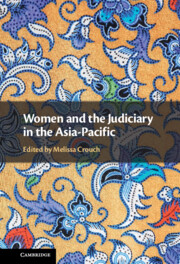Book contents
- Women and the Judiciary in the Asia-Pacific
- Women and the Judiciary in the Asia-Pacific
- Copyright page
- Contents
- Figures
- Tables
- Preface
- Contributors
- Abbreviations
- 1 The Feminisation of the Judiciary in the Asia-Pacific
- 2 ‘To Join the Bench and Be Decision-Makers’
- 3 Reframing Feminist Imperatives in Adjudication through a Reading of Sri Lankan Jurisprudence
- 4 Women in the Thai Judiciary
- 5 The Promise and Paradox of Women Judges in the Judiciary in Indonesia
- 6 Filipino Women Judges and Their Role in Advancing Judicial Independence in the Philippines
- 7 One Decade of Female Judges in the Malaysian Shariah Judiciary
- 8 Gender on the Bench Matters for Sustainable Development
- 9 Feminising the Indian Judiciary
- 10 Concluding Remarks
- Index
- References
1 - The Feminisation of the Judiciary in the Asia-Pacific
The Challenges of Formal and Substantive Equality
Published online by Cambridge University Press: 21 October 2021
- Women and the Judiciary in the Asia-Pacific
- Women and the Judiciary in the Asia-Pacific
- Copyright page
- Contents
- Figures
- Tables
- Preface
- Contributors
- Abbreviations
- 1 The Feminisation of the Judiciary in the Asia-Pacific
- 2 ‘To Join the Bench and Be Decision-Makers’
- 3 Reframing Feminist Imperatives in Adjudication through a Reading of Sri Lankan Jurisprudence
- 4 Women in the Thai Judiciary
- 5 The Promise and Paradox of Women Judges in the Judiciary in Indonesia
- 6 Filipino Women Judges and Their Role in Advancing Judicial Independence in the Philippines
- 7 One Decade of Female Judges in the Malaysian Shariah Judiciary
- 8 Gender on the Bench Matters for Sustainable Development
- 9 Feminising the Indian Judiciary
- 10 Concluding Remarks
- Index
- References
Summary
Women in the judiciary in the Asia-Pacific are understudied. Building on the comparative literature on women in the judiciary, this chapter considers the extent to which we can identify the feminisation of the judiciary in the Asia-Pacific, past and present. The authors question the meaning of the feminisation of the judiciary across the Asia-Pacific, and how gains have been made on issues of entry into the profession and the more substantive issue of the difference women judges can make. An example of the increase in women judges and advocacy for women’s issues in the profession is the formation and growth of women’s bar associations and women’s judicial associations. We identify that some jurisdictions, such as Indonesia, had female appointments to the highest court well before some jurisdictions of the Global North. But overall, there are still many ‘firsts’ in terms of women’s entry and career progression into various tiers of the judicial profession. We argue that the extent to which we can speak of the feminisation of the judiciary in the Asia-Pacific relates to the wider issues of recognition, equality and non-discrimination for women in society more broadly. The judiciary in the Asia-Pacific, as in much of the Global South, is influenced by religious, traditional and customary values and practices, as well as postcolonial realities of corruption, inequality and violence.
- Type
- Chapter
- Information
- Women and the Judiciary in the Asia-Pacific , pp. 1 - 28Publisher: Cambridge University PressPrint publication year: 2021



